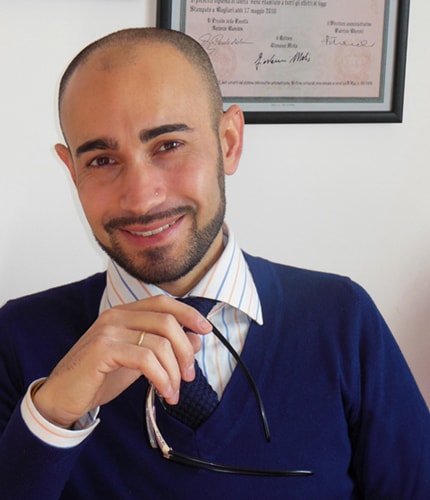Riccardo Povolo

I graduated in psychology in 2009 and specialized in Gestalt psychotherapy in 2011 I continued my training by acquiring additional clinical tools such as hypnosis and EMDR which I still use in my clinical practice. I love working in individual psychotherapy because it creates favorable conditions to go deep into every human experience.
An important part of my work is dedicated to couple psychotherapy, a space in which I can help people to create a healthy foundation for what will be a very important part of their lives, the couple. I like to have as a compass for my growth the awareness that every goal is first of all a mirror of my skills but even more an excellent basis for a subsequent goal.
I want people to know that participating in psychotherapy with me is first of all creating a healthy and deep therapeutic relationship and acquiring a healthy relational language that will then be used outside the study. You will learn a new way to be able to better manage all the relationships that you will meet in life and understand why the past ones didn’t work at their best. In fact, we live continuously immersed in relationships both with others and even more so with ourselves. Being in a healthy relationship will allow us to create the best psychological functioning we need.
I like to remind people that we are full of skills and that only we can begin to truly recognize them and make them good tools to use in everyday life. The moment we think we can do something, we are already recognizing our own ability. It is then that we must invest in it without waiting for someone outside of us to confirm its existence.
How I work
My work is based on the fact that every person has a past history, experiences that have led to as manyexperiences to date. Here emerges the complexity of each one of us and that single story that will give us the opportunity to appreciate, protect and enhance ourselves in the present. In these few lines we can grasp which deep work can reserve an interview or psychotherapy path. In it the person will be able to give a specific importance to himself, he can learn to see himself with a careful eye to grasp all those nuances that characterize him. The past will be used to learn to read and to make the best use of the present in which we are being immersed.
Each path of Psychotherapy is a new relationship, a micro-world in which a person has the opportunity to see and experience his or her own functional and dysfunctional relational styles with which he or she approaches the present.
I highlight some fundamental points that reflect my psychotherapy paths:
Awareness
Basically, psychotherapy is an acquisition of awareness about yourself. These take place within a continuous exchange, between an impartial, non-judgmental eye and a person curious to see themselves with external eyes. Acquiring new awareness corresponds to growing psychologically and finding a greater degree of integration.
Feeling one’s own need
The vitality present within you is nothing more than the focus and awareness of what your need is. Feeling listened to, understood, and learning to express needs, lays a healthy foundation to find your comfort and energy in living. You are neglecting your needs and you are neglecting that next goal that moves you energy in the present.
An emotional/subjective world
A healthy approach to building a healthy relationship both with yourself and with the other, lies in knowing your own and others’ subjectivity as “absolutely true”. You will bring out your emotional world, learn to recognize it as objectively right, and integrate it with your living environment. The more you do this, the more you will be able to recognize your own and others’ subjective emotionality as “objectively” true.
Your times
How quickly is a course of psychotherapy being carried out? This will be decided first and foremost by yourself, because physiologically everyone has their own way of developing and achieving their own growth. Here lies also the beauty in becoming aware of how one is and what the margins for improvement can be.

Other Psychotherapies

I am I. You are you.
I am not in this world to live up to your expectations,
and you are not in this world to live up to mine.
I do my thing. You do your thing.
if by chance we find each other, it’s beautiful;
If not, it can’t be helped.”
“If you take responsibility for what you’re doing,
the way you produce your symptoms,
the way you produce your disease,
the way you produce your existence
– the moment you come into contact with yourself –
then growth begins, integration begins.”
Friedrich Salomon Perls
Basically, Gestalt leads the person to a global self-knowledge, capable of achieving a healthy contact with the other. It is precisely in this contact (in the boundary of contact) that every human being stages his own relational style with its functional and dysfunctional nuances.
Gestalt was born in America in the 50s thanks to the focus of the German psychoanalyst Frederick Perls, his wife Laura Posner and a group of American intellectuals, including Paul Goodman and Isadore From. It has a wide application that involves the individual, the couple, the family, the group and organizations.
Gestalt is a coherent synthesis of several philosophical, methodological and therapeutic currents from Europe, America and the East: “the whole is different from the sum of the parts”.
Learning to feel one’s own body and the emotions present in it, becomes a central point of this therapy. This is recognized as the ability to be in the “here and now”, in the present.
Being in the “here and now” allows us to enter into the relationship with all our senses and create a more functional “contact” with the other.
The Gestalt does not work by rationally elaborating the solution of the problem. It follows a different path, that of being in contact with one’s own sensory and emotional world and using the same to bring out a different way of adapting to the problem itself (creative adaptation).
Contact cycle
Gestalt focuses in the cycle of contact that process that leads us to the satisfaction of our need. This process has been enclosed in different phases and described differently by some Gestalt psychotherapists. What we want to focus on, is the existence of this process regardless of the amount or focus of the phases.
We describe below the evolution of this process by dividing it into 7 phases:
- Sensation: the emergence as a figure from the background of a specific sensation. We are being put in contact with what may be the guiding sensation of our body (for example, having a dry mouth, feeling too hot/cold) but without being consciously aware of it yet;
- Awareness: we realize that there is a need in us, specifically related to the first phase of the sensation;
- Mobilization: the awareness of the need generates an activation of resources in order to satisfy the awareness of the need born in the previous phase;
- Action: the realization of the action which is needed to satisfy the need, takes place;
- Contact: it is the moment in which we fully satisfy our need;
- Satisfaction: we say closes what is our gestalt (translated in a very practical way, birth of a need that need is brought to completion);
- Withdrawal: the previous need is brought back into the background and space can be given to a subsequent need with the process attached for its satisfaction.
These different phases become a mental guide for the optimal balance. Stay in contact with them and you will be in contact with yourself and at a given moment you will reach the maximum balance in yourself.
Other Psychotherapies
Many minds need many different tools to approach them. Psychotherapies are a synthesis of this sentence. Different points of analyses demand different techniques, in order to achieve different goals. Some are found to be a better fit for specific people, while other approaches suit others.
In the psychotherapeutic approach, the therapist and the patient/client are the three fundamental elements that need to meet positively in order to better achieve the objectives set at the beginning of the path.
At the same time, it has to be said, that as in any good relationship, feelings will guide you during your first interview and lay the path for you to recognize and define whether that therapist and the particular therapeutic approach are in line and adequately solid to generate in you the change you seek / need.

Forms
You will find different forms on this page to download, so that you can already:
- read the code of ethics of Italian psychologists (download)
- have the form for the consent of processing personal data, which is necessary for the issuing of regular invoices, deductible as per Italian health care expenses (download).
- have the form of consent for psychotherapy in the case of an adult (download)
- have the form of consent for psychotherapy in the case of a minor (download). In the latter case the parent’s consent is required. In case of parental separation, the signature and consent of both parents will be required (download).
Guarantees
1. Training
The best guarantee that I provide, is the continuous training, updates on new methods of care and the constant comparison with as many professionals in the field. This allows me to work as good as I can in my private practice and guarantee a constant quality at all times.
2. Timing in overcoming the problem
Not each psychotherapeutic intervention guarantees the achievement of an objective after a specific moment. This is because each individual is different and additionally, each person has his own timing in elaborating the psychological dynamics. This is the reason, why I never indicate a duration for those, who start to work with me, but I most certainly communicate, in line with the relational approach that characterizes my interventions, that the conclusion of a path will be defined and shared in place and first of all on the basis of the “needs” that will emerge in the person.
3. Timing of the first consultation
In addition to the timing, I consider it important to be to give my clients a space for the request for advice or the start of a psychotherapeutic path. In the case of a first interview and in order to ensure a more streamlined first visit, I can guarantee online counselling within 24-48 hours of the request. If manageable timewise and logistically, an on-site consultation can be done. However, please note, that either office in Oristano and Nuoro is usually only open one day a week.
4. Fiscal Documentation
Since psychotherapy is health care service in its own right, there is a way to account each psychotherapy session, towards a deduction for tax expenses.
Since the beginning of 2020 it is compulsory to pay in a traced manner, whereas it is also possible to pay with Pos at the end of the consultation for those who wish to do so.
Payment in cash is always possible, but please note, that in this case it is not possible by law to deduct expenses.
5. Register of Psychologists
Adjust the registration in the register of psychologists of the region of Sardinia, with the n.2010, as psychologist and psychotherapist. This will guarantee the respect of the deontological code of the psychologist profession.
